Tips on How to Store Filmmaking and Video Gear
For Solo Filmmakers and Video Creators
If you’re wondering how to store filmmaking gear, this post is for you.
I’ve been a solo filmmaker and video creator for over ten years. And I know from experience that figuring out how to store gear can be a real pain in the ass!
Written by Colette Nichol, Solo Filmmaker and Story Strategist
Estimated reading time: 8 minutes
Effective storage of filmmaking gear not only prolongs the life of your equipment but also ensures that you’re ready to shoot.
You can easily grab your camera, lens, batteries, tripod, and SD card and go shoot something! In this post, I’ll share some tips on organizing and storing your gear, along with answers to some common questions about maintaining the integrity of your filmmaking tools.
When I first started out, I struggled to create a logical way to organize my gear.
So all I did was just make sure all the gear was located in ONE place. This allowed me to stay organized in a basic way. Over time as I accumulated more gear, I started to refine my storage set up.
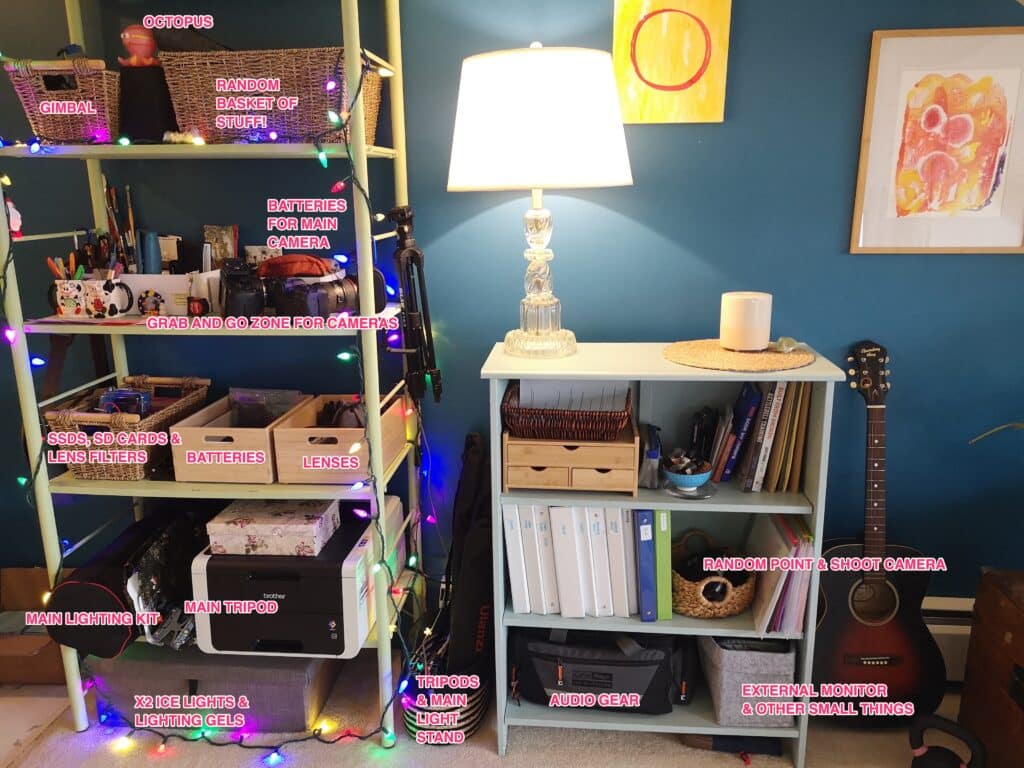
Keeping It Together
Now I keep lenses together, audio gear together, cameras together.
And I have a variety of zip bags and padded bags and cases to keep things organized.
Am I a genius at keeping my stuff organized?
No. I am not.
But I’ve got some tips and some pictures of what I do, so you can start brainstorming how you want to store your gear.
Also, I have to admit, that my gear is not in one place right now.
Because I live in a one bedroom apartment with limited storage, I currently have lighting gear under my bed and in my closet in addition to the regular gear that I keep in my designated gear zone.
My trick is that I keep all of the most important gear that I use all the time in one zone. The other gear that I only use for certain shoots gets stored elsewhere.
OK, now let’s get into these basic tips on gear storage!
10 Tips for Organizing and Storing Filmmaking Gear
1. Use Padded Bags and Cases
Store cameras, lenses, and sensitive gear in padded bags or cases to protect them from impact and prevent dust from creeping in.
That said, you might want to keep your camera out where you can quickly grab it and use it. Often gear that’s totally hidden away doesn’t get used.
My first storage solution that I bought was a padded Cinebag where I could put my camera and audio gear for any shoot. I still use this same bag to this day, so it was totally worth the purchase price.
If you’re mobile, then you’ll want to get a padded backpack designed for shooters.
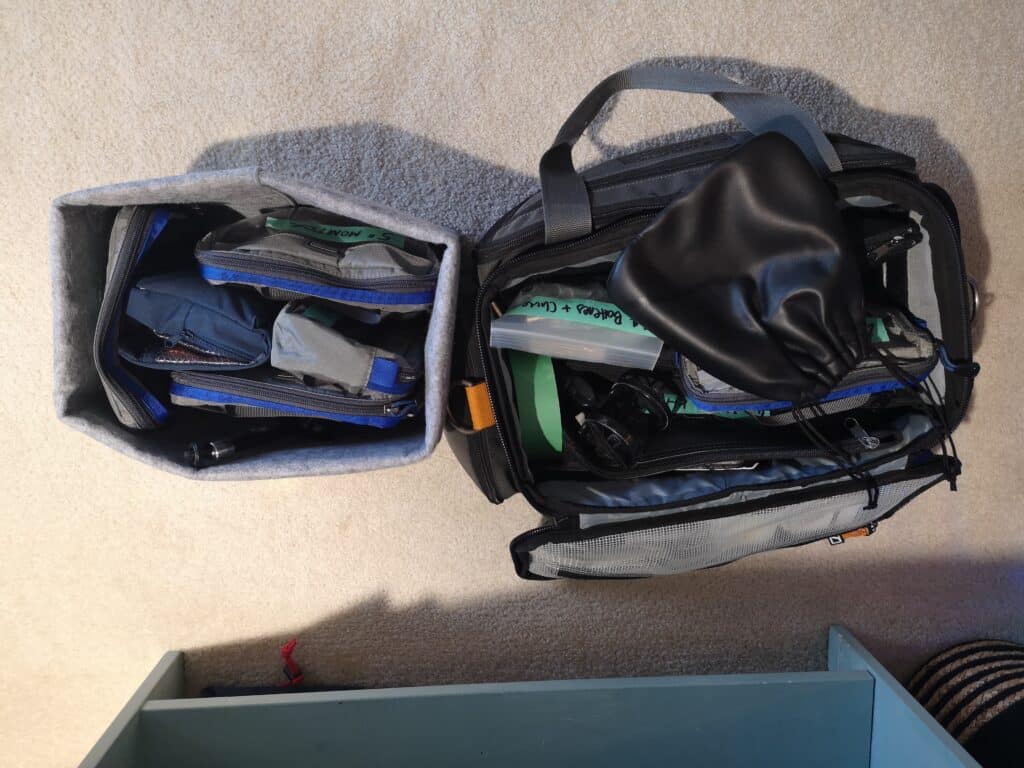
2. Label Everything
Clearly label your cases and bags for quick identification.
I have ThinkBags that I use for all the different batteries, cables, and external monitors that I have. And those are labelled.
3. Use Silica Gel Packs for Long-Term Storage
If you’re leaving your gear to just sit for a while, then you can include silica gel packs.
Put them in your storage containers to absorb moisture and prevent fungal growth. Honestly, I don’t do this. But also, I don’t let my gear sit for very long and I don’t live in a damp environment.
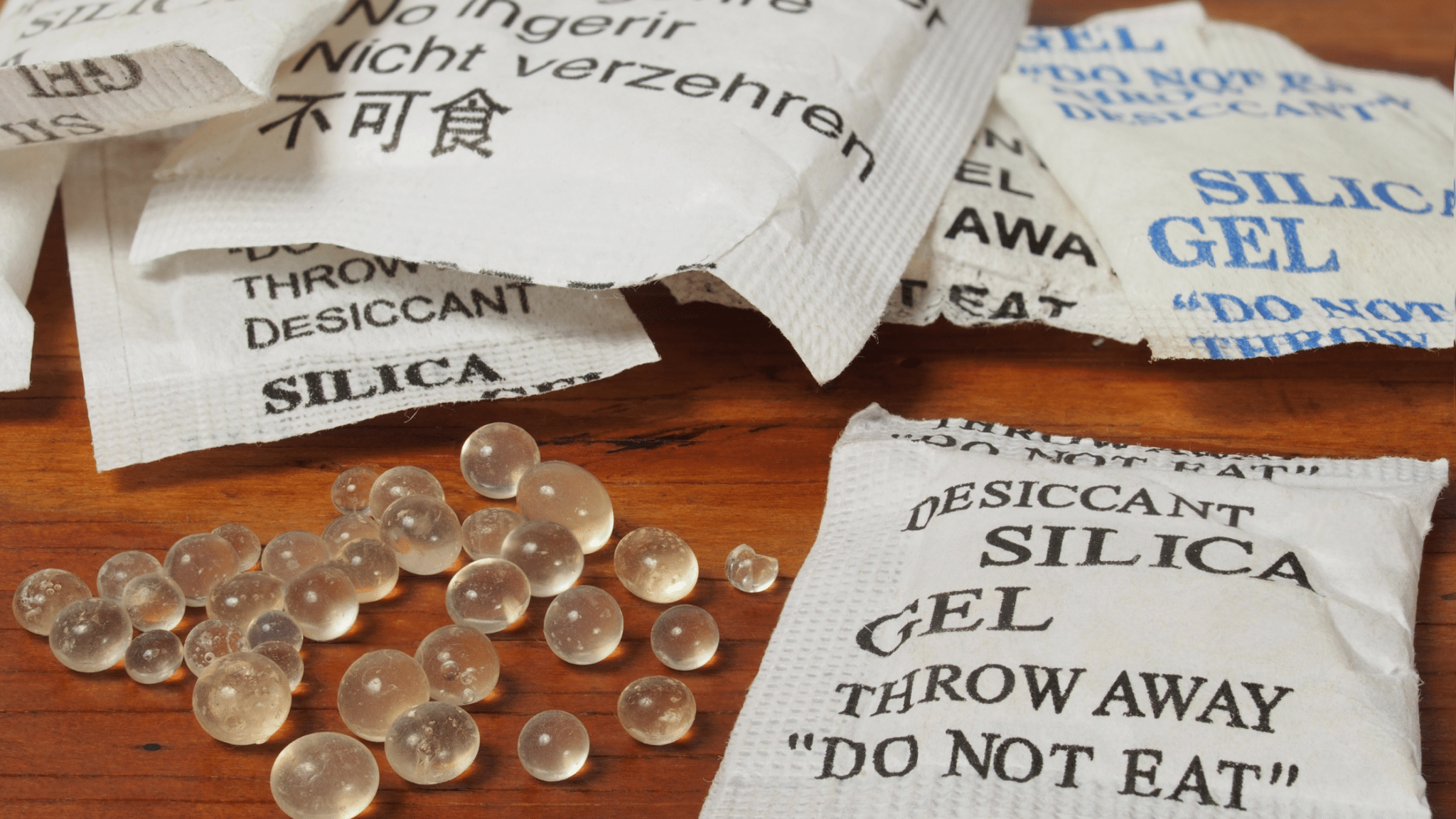
4. Separate Lenses and Bodies
Store camera bodies and lenses separately when possible to avoid dust getting into the camera sensors.
But I still recommend having your main camera and lens out and ready to use! Don’t stuff it into a drawer because then you’ll never use it!
5. Put Your Gear Somewhere Safe
Store your gear somewhere that nobody is going to mess with it or knock it over your touch it.
If that means you have to put it in a safe, by all means. You do not want anyone messing with your gear. That’s how stuff gets stolen or lost. So be anal retentive about storing your gear somewhere totally safe.
6. Organize Cables and Accessories
Use cable ties and separate pouches to keep cables and small accessories organized.
It’s so annoying to go to charge something and you can’t find the cable or the charger!
7. Use Shelving and Compartments
Shelves and compartmentalized cabinets that don’t have doors are awfully useful for camera gear.
This can help you stay organize and easily access different types of gear without the confusion of doors getting in the way.
8. Regular Maintenance and Cleaning
Regularly clean and maintain your gear.
Make sure you have lens wipes so you can clean your lens.
9. Special Care for Lighting Equipment
Store lighting equipment in sturdy cases.
Also remove batteries from LED lights if they are powered by external batteries. In general, don’t store anything with the battery attached. This includes your audio gear.
10. Maximizing Small Spaces
Use wall mounts, hanging solutions, or under-desk storage for efficient use of space.
Store your tripods standing up in a box or hanging from a wall.
11. Never Store Audio Gear with AA or AAA Batteries
I lost a $1000 light meter because like an idiot I stored it with the batteries inside.
Of course, the batteries corroded. Goodbye light meter and goodbye money. Don’t do that!
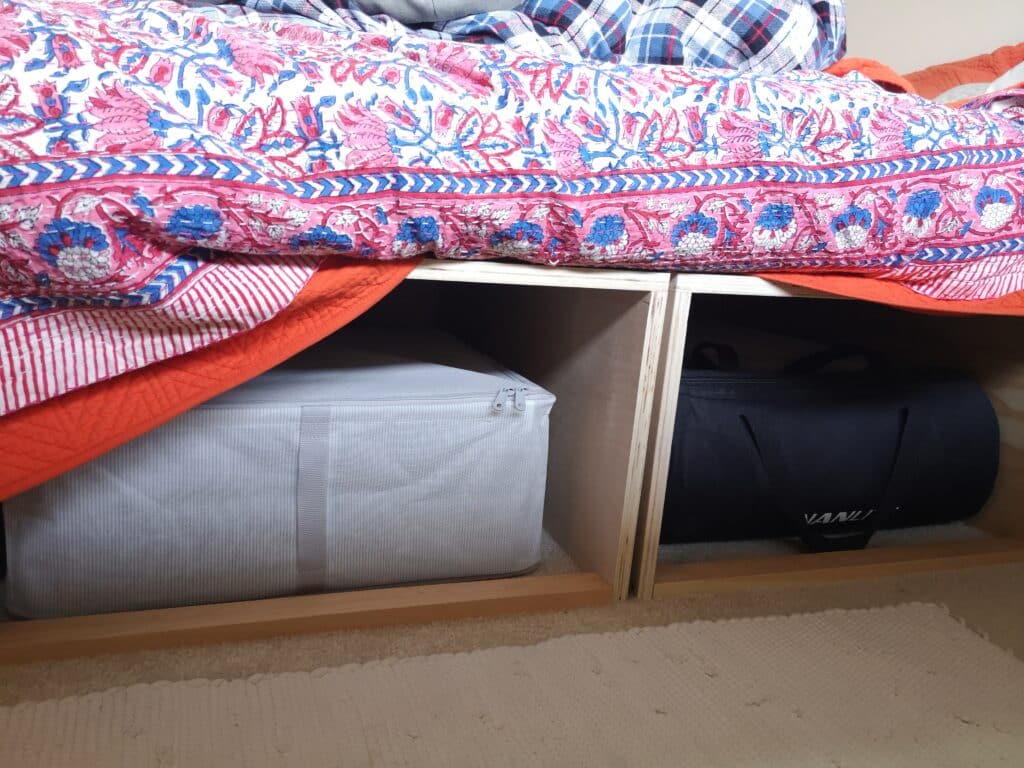
Common Questions
What is the best way to store cameras and lenses to prevent damage?
Store cameras and lenses in padded cases, away from extreme temperatures and humidity.
Use silica gels to protect against moisture if storing for a long time. For expensive lenses store them in their own protective bags.
How can I prevent mold and fungus in lens storage?
Keep your storage area dry and well-ventilated.
Use dehumidifiers or silica gel packs to control moisture. If you live in the tropics you will need to get a Dry Box!
What are the best conditions for storing gear to avoid environmental damage?
A climate-controlled environment with a consistent, moderate temperature and low humidity is ideal.
Basically don’t store your gear in the sun or in a location with mold, water, or a lot of humidity. Don’t store your gear right next to a heater.
Are there special considerations for storing lighting equipment?
Yes, store lighting equipment in cases that can protect them from impact.
Remove batteries to prevent corrosion if your lights have external batteries.
What are the best practices for storing gear in a small space?
Utilize vertical space with shelving or hanging systems.
Organize gear in a way that maximizes space while keeping items accessible. Drawers can be a good way to store cameras and lenses.
How often should I check on gear that’s stored long-term?
Check and maintain your gear every 3-6 months.
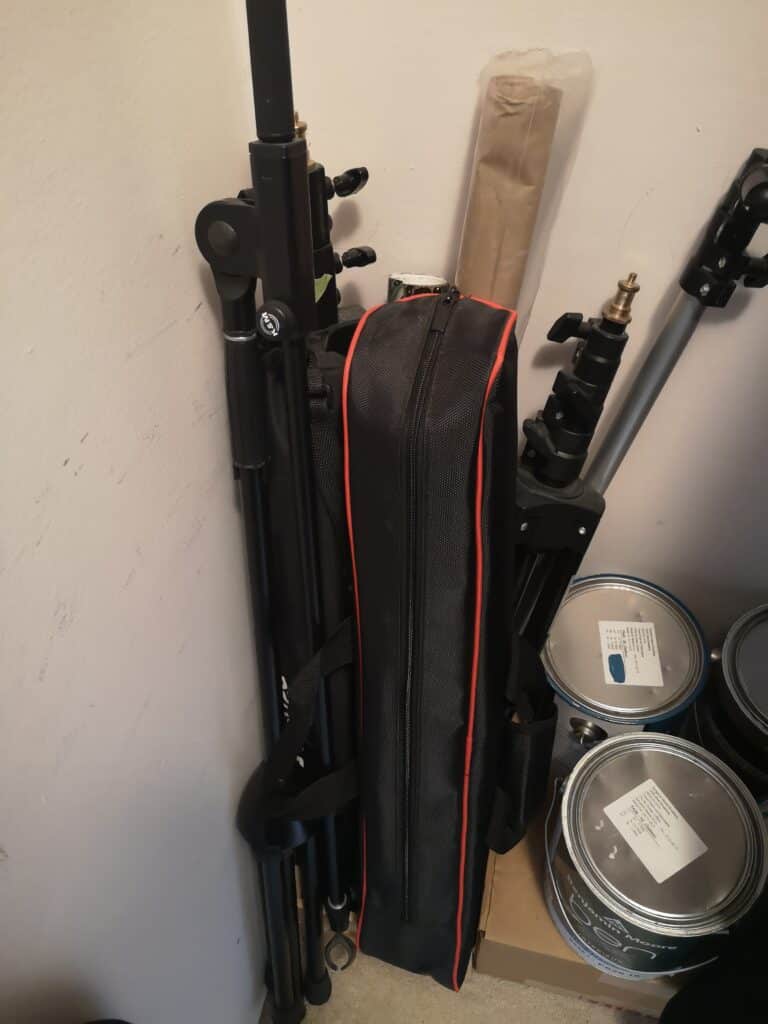
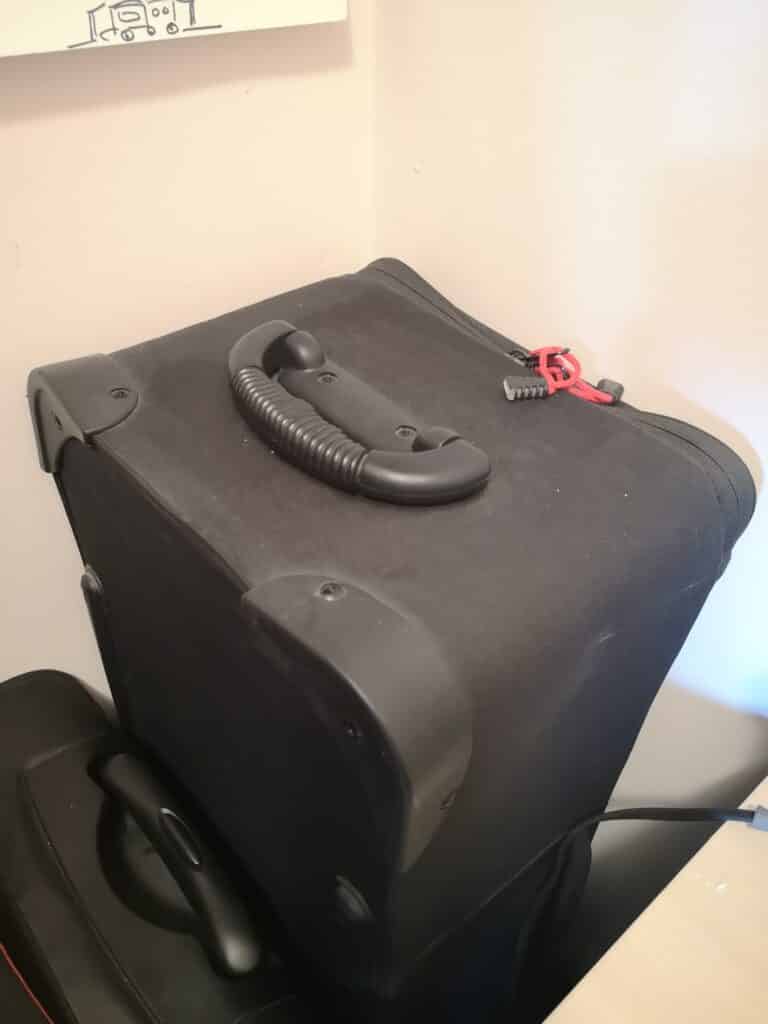
Final Thoughts
Proper storage and organization of your filmmaking gear is crucial so that you don’t waste time and money.
Storing things properly not only extends the life of your equipment but also ensures efficiency and readiness for any filming opportunity that comes your way. By following these tips and regularly checking on your stored gear, you can maintain a smooth workflow and know that you’re ready for anything at any time!
More Filmmaking Articles
⭐ How Much to Spend on Entry-Level Filmmaking Gear
⭐ Cinematic Lighting: Epic Film Lighting Guide for Beginners
⭐ Filmmaking Gear: It Might Be You…Or It Might Be Your Tools

About the Author
Hi! I’m Colette Nichol. I’m a solo filmmaker, SEO, story strategist, and digital marketer based out of rainy Vancouver, Canada. I’ve been helping small local businesses and global brands since 2014.
In 2017, I started applying SEO to my work with clients and in my own business. The results were extraordinary, and I got obsessed!
If you’re interested in working together, please reach out. I’d love to hear about your business goals to see if we can help.
We currently take on a maximum of one new client per month and are typically booked 3-months in advance, so please reach out early.